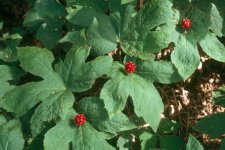 Hydrastis canadensis
Hydrastis canadensis
My first contact with Hydrastis canadensis was under
less than pleasant circumstances. Suffering a
terrible cold, accompanied by a fiery sore throat
and being opposed to the use of antibiotics, I
was resolved to suffer the symptoms while my immune system
fought back. Enter Marvin McCoy, one of my
neighbors whose family has lived in these mountains for
generations. He brought me a pint mason jar full of
these gnarly, shriveled, yellow roots.
After grinding a few up in the blender, making a tea
and letting it cool, I tried to get it down my throat
in spite of the protests by my taste buds. It just
happens to be one of the most bitter tastes that you can
imagine. Well, this story has a happy ending as
I was almost instantly cured.
On the ornamental side, Hydrastis canadensis
makes an interesting addition to any shade border or
natural garden. The handsome foliage unfurls very
sexily in the early Spring, followed by quarter sized
white flowers reminiscent of Trautvetteria
caroliniana, another Ranunculaceae family
member. The flowers stick around about a week or so
and then begin their summer long transformation into a
brilliant red berry.
This is a plant that has all season long interest and is
very easy to grow.
Have you ever considered having your own medicinal plant
garden? Perhaps the oldest and most famous one of all
is in the UK. The Chelsea Physic Garden can be found
at http://www.chelseaphysicgarden.co.uk/
Founded in 1673, the Garden's moniker "Enter a
magical environment of botany and wonder" rings true.
This very well organized garden is home to over 5000
taxa. Their collection concentrates on medicinal
plants and those of ethnobotanical interest, as well as
rare and endangered species.
By the way, if you are interested in medicinal
plants, you'll see a link below for Stephen
Foster. Stephen is a pioneer in modern herbalism and
has many books about the subject under his belt. He
is most responsible for educating the modern day public
about the use of Echinacea . Stephen's web site is
very well assembled and full of valuable and interesting
information.
It would be difficult to mention Stephen and to not mention
Jim Duke in the same breath. There is not enough room
in this email or on the Internet for that matter to tell
you about Jim Duke, the man and his work. So I will
just direct you to his web site and let Jim tell you about
himself http://www.fathernaturesfarmacy.com/ I
promise that you will be delighted, educated and
entertained.
Propagation of Hydrastis canadensis is easy by
division in the early Spring, but the quickest way to
get a colony up and going quickly is to macerate the red
berries of late summer in a colander under running water
and immediately sow the shiny black seeds.
I've put up an image gallery illustrating the life cycle of
Hydrastis canadensis at: http://www.sunfarm.com/plantlist/hydrastis_canadensis.phtml
This is the first image gallery in my "Master
Plan" to chronicle all of the different plants that I
know and grow. I'm photographing and scanning
thousands of plants from early spring emergence to seed
production at the end of their growth cycle. My hopes
are that this endeavor will aid in identification of
species in the wild and help fellow gardeners determine
what plants they would like to grow in their gardens.
I'm also having a hell of a lot of fun doing it.
Taxonomic Hierarchy
Kingdom - Plantae - Plants
Subkingdom - Tracheobionta - Vascular
plants
Superdivision - Spermatophyta - Seed
plants
Division - Magnoliophyta - Flowering
plants
Class - Magnoliopsida - dicotyledons
Subclass - Magnoliidae
Order - Ranunculales
Family - Ranunculaceae
Genus - Hydrastis
Species - canadensis
Common name - genus - "Goldenseal"
Common name - species - "Goldenseal"
Synonyms - none that I have
found
Native of - Eastern US
USDA Hardiness Zone - zone 5
Light preference - Full shade to dappled sunlight
Soil fertility preference - Average
Soil moisture preference - Average to well
drained
Bloom time - Early to mid spring
Bloom color - White
Foliage - Medium green
Spread - 4"-8"
Height - 8" - 16"
Landscape uses - Naturalizing in a shade,
woodland or medicinal plant garden
Medicinal uses - see: http://www.stevenfoster.com/education/monograph/goldenseal.html
|


 Hydrastis canadensis
Hydrastis canadensis